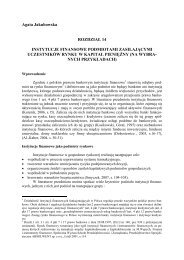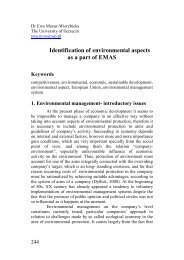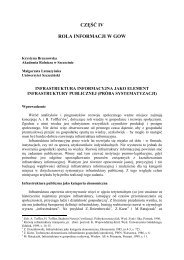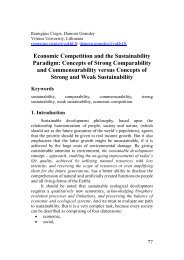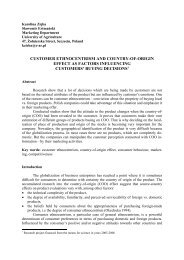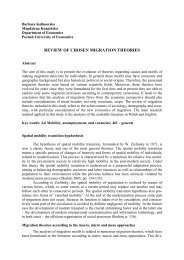corporate social responsibility as a valuable contribution to ...
corporate social responsibility as a valuable contribution to ...
corporate social responsibility as a valuable contribution to ...
Create successful ePaper yourself
Turn your PDF publications into a flip-book with our unique Google optimized e-Paper software.
Corporate Social Responsibility <strong>as</strong> a Valuable Contribution <strong>to</strong> Improvement ... 27<br />
hand while competing. About three fourths of respondents stated they provided their<br />
shareholders and other partners with better access <strong>to</strong> information on their campaigns from<br />
now on.<br />
Firms that invest in CSR may emph<strong>as</strong>ize their <strong>contribution</strong> <strong>to</strong> a particular venture and<br />
present benefits they gain from such actions right away. Besides, such firms are perceived <strong>as</strong><br />
modern enterprises that establish standards, understand cus<strong>to</strong>mers and respond <strong>to</strong> their needs,<br />
<strong>as</strong> well <strong>as</strong> pay attention <strong>to</strong> the effect exerted by products they manufacture (mallenbaker.net,<br />
2008).<br />
Nevertheless, a kind of superficiality can be noticed in the c<strong>as</strong>e of <strong>corporate</strong> <strong>social</strong><br />
<strong>responsibility</strong> rules. More is said about <strong>responsibility</strong> than done. Hence, firms implementing<br />
the integral <strong>responsibility</strong> programmes face even a greater challenge. Furthermore, it should<br />
be stated that declarations not supported by actions may bring loss <strong>to</strong> a firm <strong>as</strong> <strong>social</strong><br />
awareness of different groups of stakeholders is growing f<strong>as</strong>t. Especially if they find out that<br />
there are firms that really act responsibly.<br />
In practice, before firms present solemn declarations concerning the implementation of<br />
<strong>social</strong> <strong>responsibility</strong> concept, they should analyse certain issues and elements helpful in the<br />
creation of <strong>social</strong> <strong>responsibility</strong> management system. These issues are <strong>as</strong> follows (Rok, 2007):<br />
1. Identification of key external and internal stakeholders.<br />
2. Development of a long-term plan and mission of a firm paying attention <strong>to</strong> values<br />
important <strong>to</strong> <strong>corporate</strong> strategy.<br />
3. Formulation of priorities in the scope of <strong>social</strong> policy.<br />
4. Appointing persons responsible for pursuing the <strong>social</strong> policy (managerial staff and<br />
employees from particular departments).<br />
5. Analysis of hither<strong>to</strong> existing programmes and obligations taken on by a firm <strong>to</strong> groups of<br />
stakeholders in recent years.<br />
6. Detailed analysis of <strong>social</strong> <strong>responsibility</strong> strategies in firms under consideration (in trades).<br />
7. Organization of meetings with representatives of the most important groups of stakeholders<br />
in order <strong>to</strong> get <strong>to</strong> know mutual expectations.<br />
8. Formulation of <strong>social</strong> policy rules.<br />
9. Establishing specific principles on the b<strong>as</strong>is of existing determinants (legal regulations,<br />
voluntary obligations, operational aims, financial outlays).<br />
10. Development and implementation of strategies with reference <strong>to</strong> particular groups of<br />
stakeholders.<br />
11. Proper communication and information in the scope of <strong>social</strong> policy.<br />
12. Training and advisory services in the scope of <strong>social</strong> policy pursued.<br />
13. Establishing and selecting methods for indica<strong>to</strong>r <strong>as</strong>sessment (KPI – key performance<br />
indica<strong>to</strong>rs, i.e. selection of key instructions).<br />
14. Reporting (writing down the rules, ways of realization, results).<br />
15. Control and review of results by managers – external audit.<br />
16. Involving the suppliers in the programme (determination of expectations and suggestions).<br />
17. Improvement in human resources management system in enterprises.<br />
18. Propagation of rules among all the stakeholders (everyone treated equally).<br />
19. Open door policy and external communication (<strong>social</strong> reports, publications, lectures,<br />
seminars).<br />
20. Recognizing <strong>social</strong> policy and external policy <strong>as</strong> key elements in organizational policy,<br />
involving groups of stake holders in management.<br />
One should also pay attention <strong>to</strong> the fact that (despite many benefits accruing from<br />
CSR and firms that will really put CSR concept in practice) behaviour of some firms will not<br />
be in accordance with CSR rules. This consists mainly in the fact that some firms become<br />
involved in <strong>social</strong> initiatives in order <strong>to</strong> improve their image or regain the standing of a



